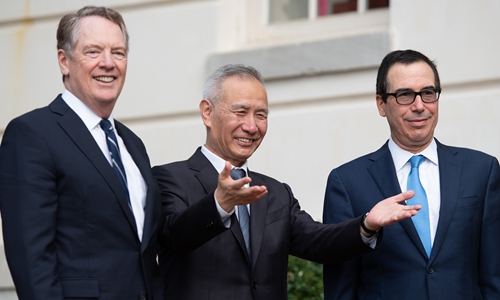HOME >> SOURCE
Chinese vice premier to sign phase one trade deal in the US next week
Source:Global Times Published: 2020/1/9 15:09:56

File photo: VCG
At the invitation of the US, Liu and his delegation will visit Washington from January 13-15 to sign the phase one agreement, Gao Feng, a spokesperson for MOFCOM, told a press briefing in Beijing. He added that officials were still in close contact over specific arrangements for the signature of the deal.
MOFCOM's announcement confirmed an earlier tweet by US President Donald Trump, in which he said he would sign the agreement at the White House on January 15. It also brought an end to weeks spent on finalizing the deal after an agreement was reached in mid-December.
"What this means is that both sides have wrapped up the final work on the deal and it is ready for the final part of the process - its signature," Gao Lingyun, an expert at the Chinese Academy of Social Sciences in Beijing, told the Global Times on Thursday. "The rest is just a show now."
Work on legal and translation reviews had already been completed last week, but Chinese officials waited to announce the trip until several days before it was due to take place, as is customary, and to ensure there were no changes, said Gao, who closely follows the trade negotiations. "Officials have been very cautious to make sure that everything will go smoothly," he said.
The content of the agreement remains unclear, as Chinese officials said the final text will only be released after it is signed. But as part of the deal, the US will roll back tariffs on Chinese products in phases, while China will increase purchases of US products based on market demand, Chinese officials said when the agreement was announced on December 13.
The signature of the agreement will mark one of the most significant steps by both sides to resolve the nearly two-year-long trade war that has weighed on both economies as well as global growth, Gao said.
"As we like to say in China, the beginning is always the hardest. But now China and the US have overcome that difficult step," he said. "What this shows to the world is that China and the US can address their differences through negotiations."
Global Times
Posted in: ECONOMY